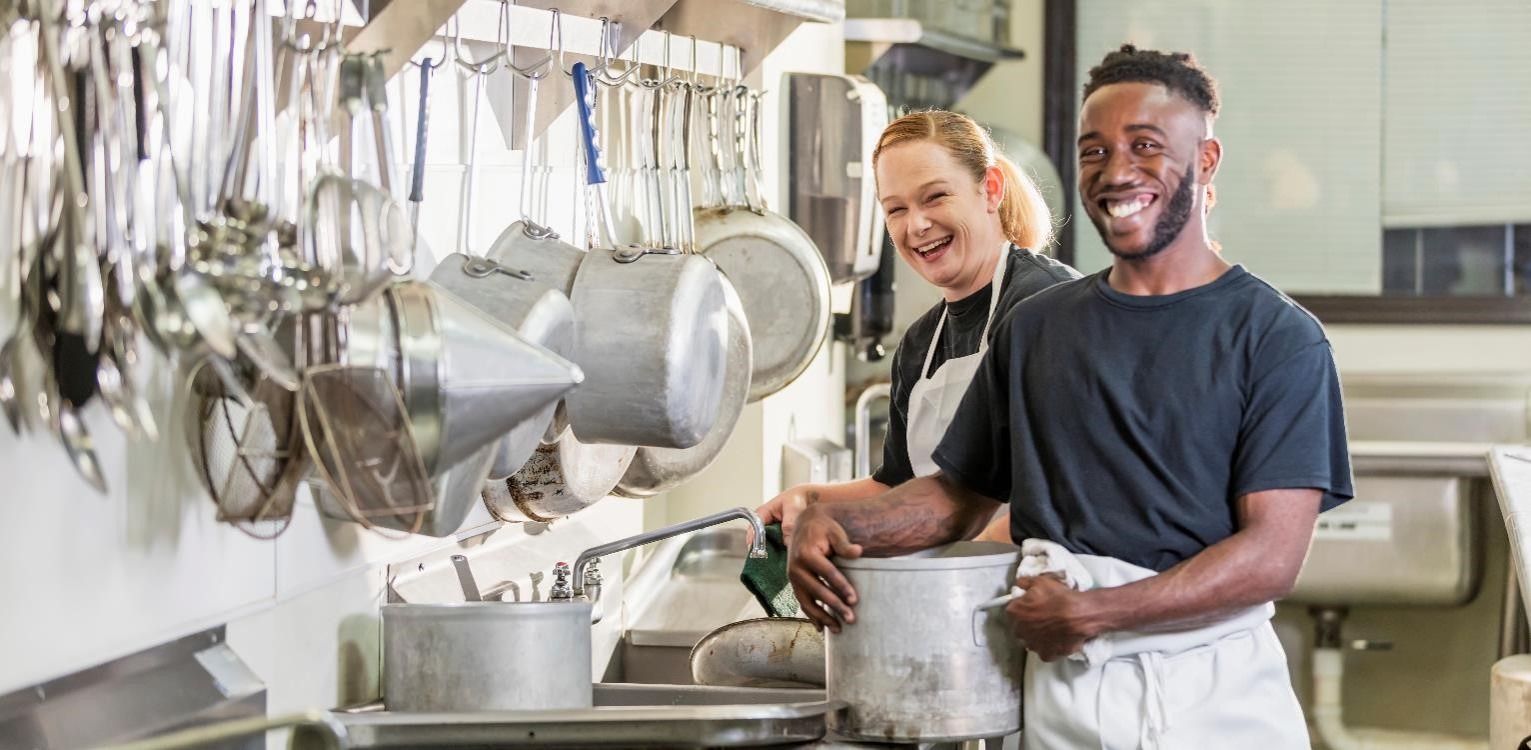Kitchen Porter CV Template
Get practical tips on creating a CV for Kitchen Porter roles, covering layout, content, and how to present your experience clearly.

It is important to make your CV stand out to an employer and there are many factors that can help with this, including the structure and layout of your writing.
1. First, you will need to write an eye-catching personal statement.
2. Follow with your work experience, listing previous roles in reverse chronological order.
3. Include a section for key skills and qualifications relevant to the role.
4. You can also include additional information such as hobbies or references, but they’re not as important.
Use our writing tips as a guide to help you cover the basics of writing a CV while we go through what a Kitchen Porter CV will need to stand out against other candidates.
How to Write a Personal Statement for a Kitchen Porter
A personal statement is the first thing an employer will read on your CV. It is important to keep it relevant by discussing the job’s desired skills and how your skill set will benefit the role and the company.
Use your personal statement to make your CV stand out with brief descriptions of your skills, you can put more detail into these topics in other sections of your CV.
Kitchen Porter Personal Statement Example
“During my time as a Waiter/Waitress, I became interested in becoming a Porter after performing various essential kitchen duties. These duties were given to me when a manager noticed my ability to learn new things quickly and my willingness to perform duties outside of my job description.
While working as a Waiter/Waitress I was often praised for my speed and efficiency when dealing with customers and cleaning tables. I worked well with the waiting staff and the kitchen staff to deliver food orders and cover tables.
I believe the skills I have acquired in my previous jobs will work well within your company, and I am enthusiastic to learn more as a Kitchen Porter.”

Ideal Work Experience for a Kitchen Porter CV
Working in a kitchen environment is very useful for a Kitchen Porter CV, however there are other related jobs that might boost your CV and help it stand out.
Which Jobs to Include
When writing down your work experience you should only mention relevant jobs that have provided useful skills. Jobs such as Barista or Bar work, or other types of hospitality jobs will be helpful in boosting your CV.
You should write down up to six relevant job positions that you’ve had in the past 10 years and mention which skills you’ve gained from each job using bullet points.
Kitchen Porter CV Work Experience Example
Start with your most recent experience and work backwards. Remember to mention the position you worked in, the name of the company and the start and end date of your service:
-
Barista at [company name] from [start date] to [end date]
-
My time as a Barista taught me the importance of food safety and how to properly prepare hot food and drinks.
-
I worked well with my team to create a positive work environment, and I was always willing to help when someone needed me.
Use this layout for each job and list your skills appropriately.
Key Skills & Qualifications for a Kitchen Porter CV
An employer will want to know what skills and qualifications you have that suit the job, mention them briefly in your personal statement and go into more detail in specific sections of your CV.
Important Skills for a Kitchen Porter
There are some essential skills that a Kitchen Porter needs, such as physical stamina, organisational skills, basic food hygiene and safety knowledge, and the ability to work well in a team.
These skills can come from many places, and you’ll need to mention which jobs have given you the skills you need to perform well as a Kitchen Porter.
Qualifications Needed to Be a Kitchen Porter
A Kitchen Porter job is considered entry-level which means you don’t need extensive training or prior experience. Employers will often ask for GCSEs in Maths and English, and having a certificate in food safety will be beneficial.
Find out what else you need to know to become a Kitchen Porter in our more in-depth guide.
Additional Content to Boost Your Kitchen Porter CV
Once you have written about your education, qualifications, employment history and skills, you can also mention any hobbies or interests that you have. Now is also a good time to write down any references.
Hobbies & Interests
Your hobbies and interests should include useful skills or experience. You can also mention any volunteer work you’ve done if it is relevant to the job.
Mention hobbies that have given you skills such as time management, attention to detail, or organisational skills. Keep this section brief, as ultimately an employer wants to know about your experience, but this is a good way to give them some insight into you as a person.
References
If you have any references, add them after your hobbies. When you use someone as a reference, they should be in a higher position than you, such as a Manager or Team Lead who recognised your passion or skills while you worked with them.
Make sure that you have their permission before using them as a reference and double-check that their information is correct.
How to Make a Kitchen Porter CV Stand Out
Being confident in your skills and abilities will help your CV stand out to an employer. Use positive language, and mention any notable achievements or praise you received from clients, customers or managers. Additional qualifications will always be a benefit if you have them.
Label the sections of your CV appropriately so that an employer isn’t confused when reading. Split your education and your work experience into different sections and add the skills you learned using bullet points instead of writing in paragraphs.
Your CV should be unique to make it more desirable for employers and keep them engaged while reading.
Mistakes to Avoid
Avoid drawn-out descriptions when writing your personal statement, any extra information should be added in the appropriate section of your CV.
Ask someone to read your CV to make sure there are no errors, and it is easy to understand.

Kitchen Porter CV Example
When you are ready to write your CV, take a look at our free CV template we have provided. This template is free to download, and it can help with the structure of your CV, helping you write the best application possible.

